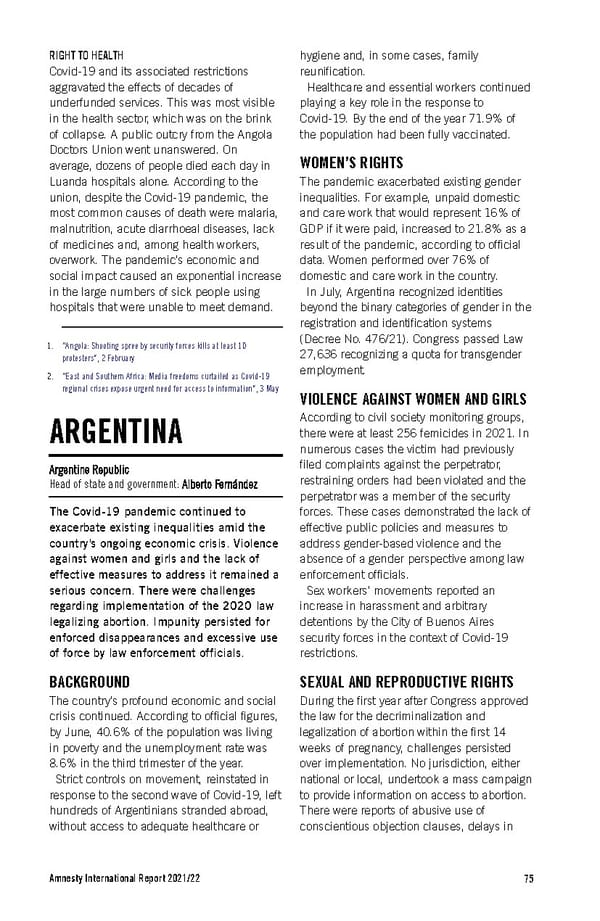RIGHT TO HEALTH hygiene and, in some cases, family Covid-19 and its associated restrictions reunification. aggravated the effects of decades of Healthcare and essential workers continued underfunded services. This was most visible playing a key role in the response to in the health sector, which was on the brink Covid-19. By the end of the year 71.9% of of collapse. A public outcry from the Angola the population had been fully vaccinated. Doctors Union went unanswered. On average, dozens of people died each day in WOMEN’S RIGHTS Luanda hospitals alone. According to the The pandemic exacerbated existing gender union, despite the Covid-19 pandemic, the inequalities. For example, unpaid domestic most common causes of death were malaria, and care work that would represent 16% of malnutrition, acute diarrhoeal diseases, lack GDP if it were paid, increased to 21.8% as a of medicines and, among health workers, result of the pandemic, according to official overwork. The pandemic’s economic and data. Women performed over 76% of social impact caused an exponential increase domestic and care work in the country. in the large numbers of sick people using In July, Argentina recognized identities hospitals that were unable to meet demand. beyond the binary categories of gender in the registration and identification systems 1. “Angola: Shooting spree by security forces kills at least 10 (Decree No. 476/21). Congress passed Law 27,636 recognizing a quota for transgender protesters”, 2 February 2. “East and Southern Africa: Media freedoms curtailed as Covid-19 employment. regional crises expose urgent need for access to information”, 3 May VIOLENCE AGAINST WOMEN AND GIRLS According to civil society monitoring groups, ARGENTINA there were at least 256 femicides in 2021. In numerous cases the victim had previously Argentine Republic filed complaints against the perpetrator, Head of state and government: Alberto Fernández restraining orders had been violated and the perpetrator was a member of the security The Covid-19 pandemic continued to forces. These cases demonstrated the lack of exacerbate existing inequalities amid the effective public policies and measures to country’s ongoing economic crisis. Violence address gender-based violence and the against women and girls and the lack of absence of a gender perspective among law effective measures to address it remained a enforcement officials. serious concern. There were challenges Sex workers’ movements reported an regarding implementation of the 2020 law increase in harassment and arbitrary legalizing abortion. Impunity persisted for detentions by the City of Buenos Aires enforced disappearances and excessive use security forces in the context of Covid-19 of force by law enforcement officials. restrictions. BACKGROUND SEXUAL AND REPRODUCTIVE RIGHTS The country’s profound economic and social During the first year after Congress approved crisis continued. According to official figures, the law for the decriminalization and by June, 40.6% of the population was living legalization of abortion within the first 14 in poverty and the unemployment rate was weeks of pregnancy, challenges persisted 8.6% in the third trimester of the year. over implementation. No jurisdiction, either Strict controls on movement, reinstated in national or local, undertook a mass campaign response to the second wave of Covid-19, left to provide information on access to abortion. hundreds of Argentinians stranded abroad, There were reports of abusive use of without access to adequate healthcare or conscientious objection clauses, delays in Amnesty International Report 2021/22 75
 Amnesty International Report 2021/22 Page 74 Page 76
Amnesty International Report 2021/22 Page 74 Page 76